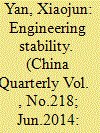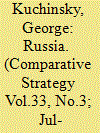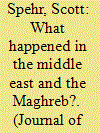| Srl | Item |
| 1 |
ID:
132957


|
|
|
|
|
| Publication |
2014.
|
| Summary/Abstract |
Given their critical influence on society and politics, university students are one of the key target groups for authoritarian political control around the world. To further our understanding of the endurance and resilience of authoritarianism in post-Deng China, it is necessary to examine one of the Party-state's most crucial control frameworks: the institutional mechanism through which it preserves social stability in the nation's 2,358 university campuses, and maintains control over its more than 22 million college students. Drawing upon intensive field research conducted in 2011, this article attempts to map out the structures and measures deployed by the post-Deng regime to nurture political compliance and consolidate its domination of university campuses. By deciphering an essential component of the state's political control apparatus, this article aims to shed new light on the internal operations of the authoritarian system that is running China today.
|
|
|
|
|
|
|
|
|
|
|
|
|
|
|
|
| 2 |
ID:
115616


|
|
|
|
|
| Publication |
2012.
|
| Summary/Abstract |
An old debate that pits democratic values against Asian traditions of strongman rule and preferences for economic progress over political reform still resonates in the region.
|
|
|
|
|
|
|
|
|
|
|
|
|
|
|
|
| 3 |
ID:
133994


|
|
|
|
|
| Publication |
2014.
|
| Summary/Abstract |
Russia's current system of government is weakening. Putin's annexation of Crimea only masks this underlying trend. The system remains centered around Putin. Putin has effectively eliminated individual and institutional political rivals. But public criticism has become more diffuse and hard to neutralize. The impact of public opinion on driving the political process is growing and the opposition is expanding and coalescing. This is manifested through multifaceted forms of dissent and the growing influence of opposition leader Aleksey Navalniy. The dissent, which was initially fueled by prominent opinion makers, evolved into sporadic protests in key urban centers and political campaigns. Why did people who used to support Putin or were apathetic become critical to the point of speaking out and even engaging in opposition activity? The most likely catalyst was the 2008-2009 financial crisis. It undermined Putin's longstanding argument that an authoritarian system, with him at the helm, was necessary for economic advancement. Beyond economics alone, resentment is driven more generally by state incapacity-incapacity to strengthen the social safety net, improve public services, and effectively address corruption; violent crime; natural disasters; and terrorism-which increasingly contrasts Putin's stability narrative. Credible estimates and public perceptions indicate that corruption levels today exceed even those of the turbulent 1990's. Russia's leadership is known to be the key driver and beneficiary of this trend, which is also an important component that fuels discontent. The opposition has not organized into a political party and the government temporarily bolstered its popularity through outside intervention. This makes it hard for the opposition to dislodge Putin and for Putin to contain the opposition, which is creating an impasse. Russia is likely to be increasingly characterized by volatility-internally and on the international stage. This volatility positions the U.S. and the European Union to have greater influence on Russia but it's important for the West to understand how to take advantage of its already substantial leverage.
|
|
|
|
|
|
|
|
|
|
|
|
|
|
|
|
| 4 |
ID:
116660


|
|
|